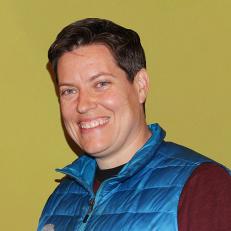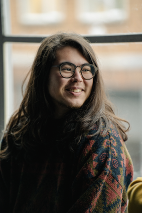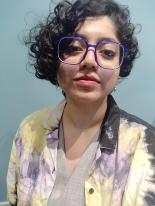Queer and Trans Performance (Exec-Sponsored Panel)
Thursday 28 August, 1.30pm-3pm
Room: Oculus 1.05
TaPRA published our Trans Solidarity Statement in May 2023 and as part of this effort we ring-fenced our minoritised scholars/artists bursary scheme for trans scholars and artists in 2024. At the University of Warwick, this August, we shall be celebrating our 20th year as an organisation and we wish to mark this moment with a TaPRA first: an TaPRA Executive Sponsored Panel that foregrounds queer and trans scholarship and artistries as fundamental to our field/s.
CHAIR
 Clare Croft is a writer, dance historian and theorist, and dramaturg and curator. She is the author of Jill Johnston in Motion: Dance, Writing, and Lesbian Life and the editor of The Essential Jill Johnston Reader, both published in 2024 by Duke University Press. She is the editor of Queer Dance: Meanings and Makings; the founder and curator of the EXPLODE queer dance festival. Clare holds a PhD in Performance as Public Practice from the University of Texas-Austin, and is Associate Professor of American Culture and Faculty Director of Creative Practice/Arts Research at the University of Michigan in the US.
Clare Croft is a writer, dance historian and theorist, and dramaturg and curator. She is the author of Jill Johnston in Motion: Dance, Writing, and Lesbian Life and the editor of The Essential Jill Johnston Reader, both published in 2024 by Duke University Press. She is the editor of Queer Dance: Meanings and Makings; the founder and curator of the EXPLODE queer dance festival. Clare holds a PhD in Performance as Public Practice from the University of Texas-Austin, and is Associate Professor of American Culture and Faculty Director of Creative Practice/Arts Research at the University of Michigan in the US.
SPEAKERS
 Dr. Nemo Madeleine Sugimoto Martin is a writer and academic. They are currently a JSPS Postdoctoral Research Fellow at Kanazawa University researching queer masculinity and domesticity in Japanese visual culture. As an academic they are the author of The Construction of Race in Les Misérables Fanworks (Bloomsbury Academic) and have two chapters on Aromantic-Asexuality in Japan and racialised gender in Les Misérables upcoming. As a writer for stage and audio they are the creator of Trice Forgotten (Rusty Quill), co-creator of ASIAN PIRATE MUSICAL, writer of BLADE: New Blood (Marvel; Six to Start) and [The Cobbled Streets of Geneva] (Ellandar).
Dr. Nemo Madeleine Sugimoto Martin is a writer and academic. They are currently a JSPS Postdoctoral Research Fellow at Kanazawa University researching queer masculinity and domesticity in Japanese visual culture. As an academic they are the author of The Construction of Race in Les Misérables Fanworks (Bloomsbury Academic) and have two chapters on Aromantic-Asexuality in Japan and racialised gender in Les Misérables upcoming. As a writer for stage and audio they are the creator of Trice Forgotten (Rusty Quill), co-creator of ASIAN PIRATE MUSICAL, writer of BLADE: New Blood (Marvel; Six to Start) and [The Cobbled Streets of Geneva] (Ellandar).
 Dr Phoebe Patey-Ferguson specialises in the social contexts of contemporary performance, focusing on queer and trans practices in festivals, nightlife and Live Art. Their work considers how countercultural practices by marginalised artists generate community, resist assimilationist narratives and embrace radical methodologies. As a lecturer and Programme Director of MA Queer Performance at Rose Bruford College, they are dedicated to developing queer pedagogical approaches to studying and creating performance. Phoebe co-edited a special issue of Contemporary Theatre Review on Live Art (2024), co-convenes the Queer Futures Working Group of the International Federation of Theatre Research (IFTR), is the co-research lead for The Night Club: an international queer performance research network and is co-chair of the board for Duckie.
Dr Phoebe Patey-Ferguson specialises in the social contexts of contemporary performance, focusing on queer and trans practices in festivals, nightlife and Live Art. Their work considers how countercultural practices by marginalised artists generate community, resist assimilationist narratives and embrace radical methodologies. As a lecturer and Programme Director of MA Queer Performance at Rose Bruford College, they are dedicated to developing queer pedagogical approaches to studying and creating performance. Phoebe co-edited a special issue of Contemporary Theatre Review on Live Art (2024), co-convenes the Queer Futures Working Group of the International Federation of Theatre Research (IFTR), is the co-research lead for The Night Club: an international queer performance research network and is co-chair of the board for Duckie.
 Supraja R's research traverses boundaries of interdisciplinary and transdisciplinary inquiry, informing their doctoral studies at Brunel University of London, supported by the final cycle of the Techne DTP (AHRC). As a pedagogue, critic, and curator, they mindfully bridge scholarly research and artistic practice, fostering conversations that extend beyond traditional disciplinary limits. Among their initiatives is the ongoing Performing Re-Markings program, an online series funded by the Performance Studies International (PSi) Constellate events of 2025. This platform highlights Indian artists whose queer and/or non-conforming aesthetic practices resonate across local and global contexts. Supraja has published in notable theatre journals such as the Contemporary Theatre Review (2023) and Critical Stages/Scènes critiques (2021). Their visual essay and performance review, which extend their theoretical work, Cleaving, into artistic domains, has appeared in Alternative South Asia Photography (ASAP) | Art (2023), Shared Ecologies: Insubordinate Vitalities (forthcoming, 2026), and Qurbatein: A Gender and Sexuality Bi-annual (2022). [ONLINE]
Supraja R's research traverses boundaries of interdisciplinary and transdisciplinary inquiry, informing their doctoral studies at Brunel University of London, supported by the final cycle of the Techne DTP (AHRC). As a pedagogue, critic, and curator, they mindfully bridge scholarly research and artistic practice, fostering conversations that extend beyond traditional disciplinary limits. Among their initiatives is the ongoing Performing Re-Markings program, an online series funded by the Performance Studies International (PSi) Constellate events of 2025. This platform highlights Indian artists whose queer and/or non-conforming aesthetic practices resonate across local and global contexts. Supraja has published in notable theatre journals such as the Contemporary Theatre Review (2023) and Critical Stages/Scènes critiques (2021). Their visual essay and performance review, which extend their theoretical work, Cleaving, into artistic domains, has appeared in Alternative South Asia Photography (ASAP) | Art (2023), Shared Ecologies: Insubordinate Vitalities (forthcoming, 2026), and Qurbatein: A Gender and Sexuality Bi-annual (2022). [ONLINE]
 Ray Young is an award winning trans-disciplinary performance artist, theatre maker and writer; preoccupied with notions of rest, care and recovery in art. Their work exists at the boundaries of activism, queerness, race and neuro-diversity. Exploring what it is like to be a neurodivergent artist; and what it means to both create and receive art at a slow pace, outside of the capitalist ideologies of production. Holding space for those at the intersection of multiple realities, through collaboration and resistance to traditional form.
Ray Young is an award winning trans-disciplinary performance artist, theatre maker and writer; preoccupied with notions of rest, care and recovery in art. Their work exists at the boundaries of activism, queerness, race and neuro-diversity. Exploring what it is like to be a neurodivergent artist; and what it means to both create and receive art at a slow pace, outside of the capitalist ideologies of production. Holding space for those at the intersection of multiple realities, through collaboration and resistance to traditional form.
